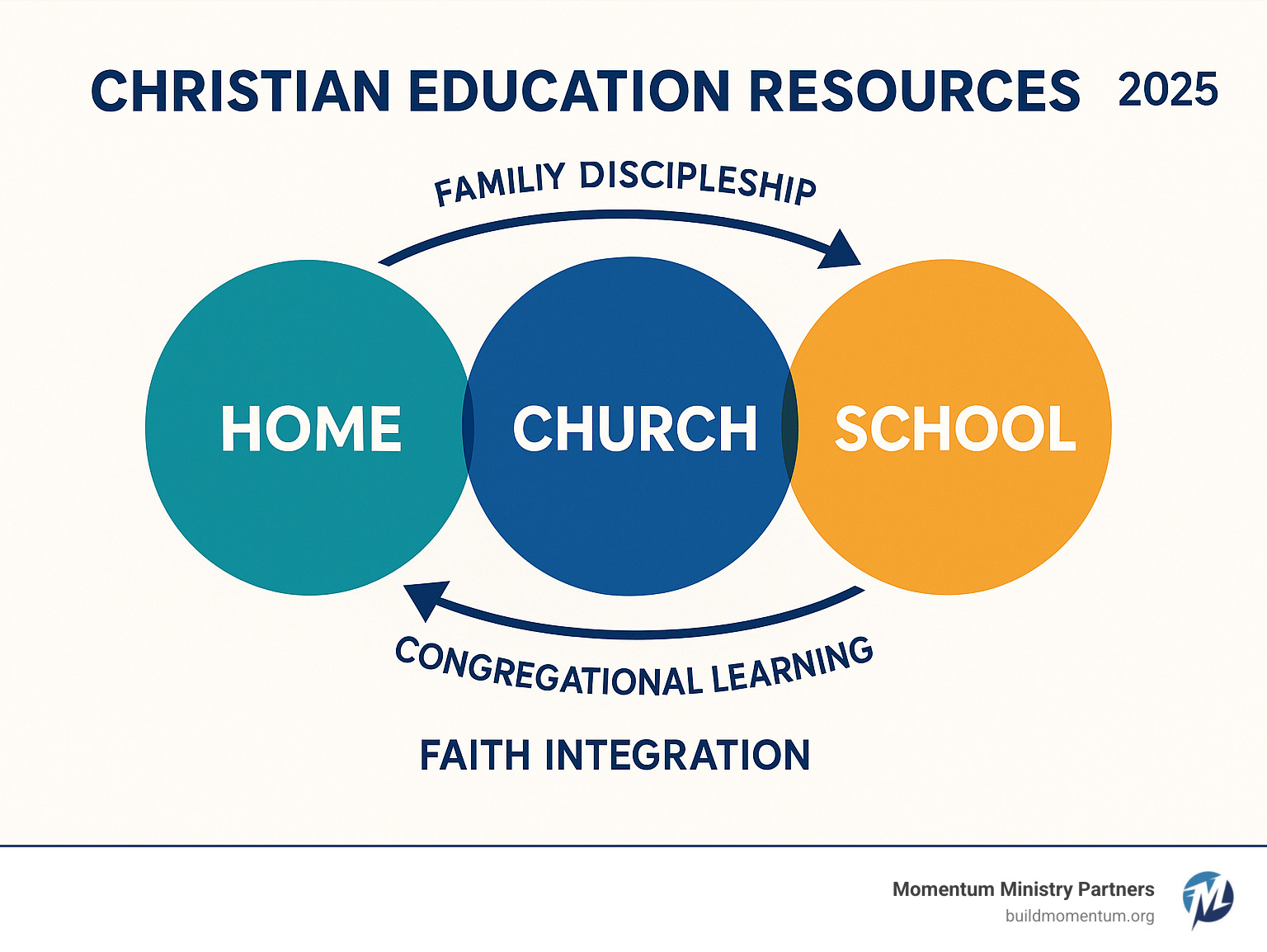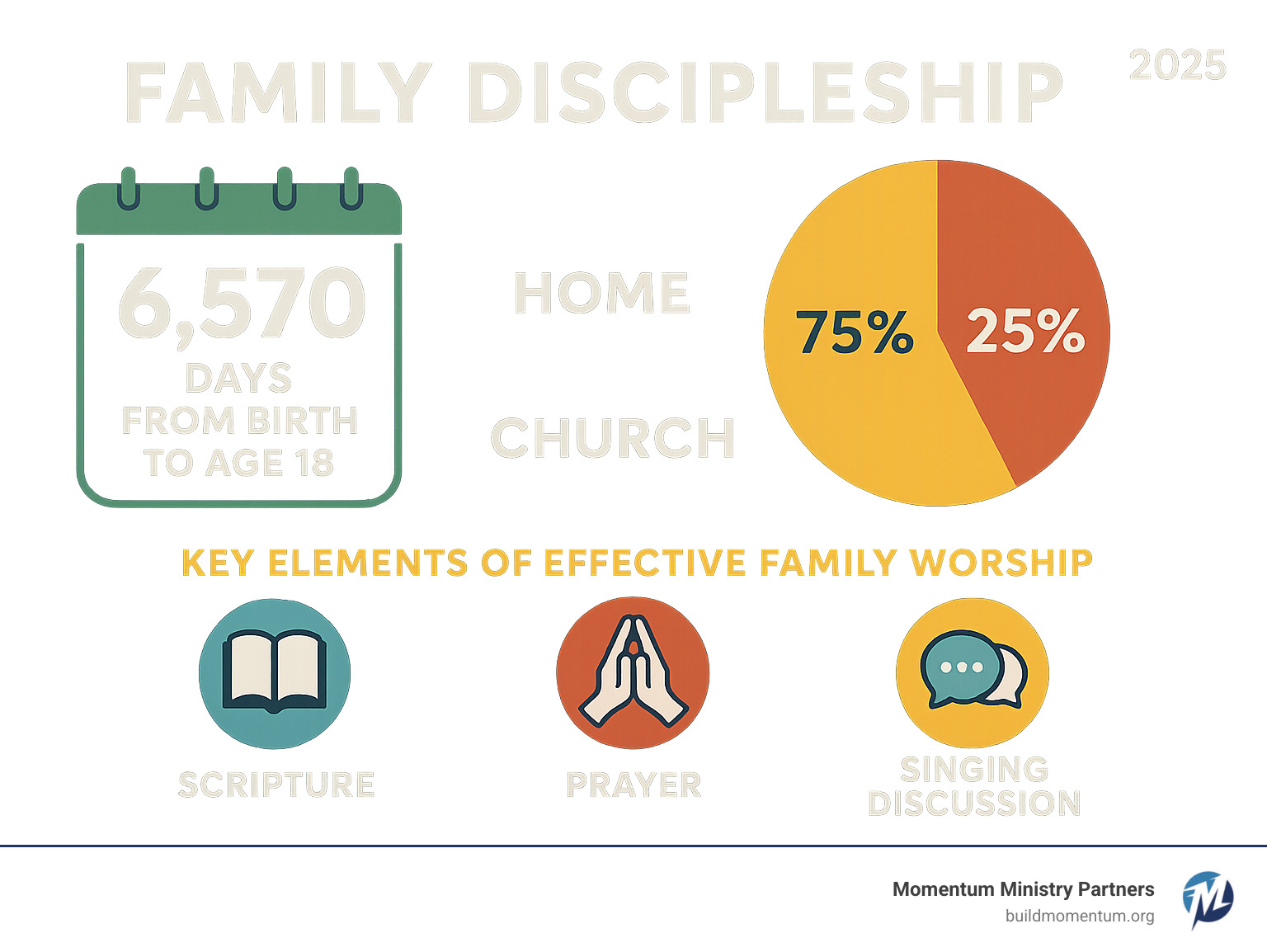Equipping the Saints for Every Good Work
Christian education resources are essential tools designed to foster spiritual growth, biblical literacy, and discipleship across all ages and learning environments. These resources serve three primary audiences:
- Parents seeking to disciple their children at home
- Church leaders developing Sunday School, youth programs, and adult education
- Educators integrating faith into their teaching practice
The most effective Christian education resources span multiple formats – from traditional curricula and devotionals to digital courses and multimedia content. They’re designed to work in homes during family worship, in churches through small groups and classes, and even in public schools where appropriate.
Quality resources share common characteristics: they’re biblically grounded, age-appropriate, engaging, and practical for real-world application. Whether you’re teaching a toddler about God’s love or equipping teenagers for leadership, the right materials can transform learning from routine instruction into life-changing encounters with truth.
I’m Jeff Bogue, and over three decades of ministry leadership have shown me how powerful the right Christian education resources can be in shaping lives. Through my work with Momentum Ministry Partners, I’ve seen how quality materials and training experiences can equip the next generation of believers to love God deeply and serve Him faithfully.

A Diverse Toolkit: Types of Christian Education Resources for Every Need
The world of Christian education resources is wonderfully diverse, offering something for every learner, every setting, and every stage of faith development. Whether you’re a parent looking for family devotionals, a Sunday School teacher preparing next week’s lesson, or a youth pastor planning a summer series, the right tools can transform ordinary moments into extraordinary encounters with God’s truth.
At Momentum Ministry Partners, we’ve had the privilege of seeing how the right resources can breathe new life into struggling programs and take thriving ministries to the next level. The key is understanding what’s available and finding the perfect fit for your unique situation.
Foundational Curricula and Textbooks
Think of curricula as the backbone of effective Christian education. These structured resources provide the roadmap for spiritual growth, ensuring that learners progress systematically through biblical truth while building a solid foundation for lifelong faith.
Homeschool curricula have revolutionized how families approach Christian education at home. These comprehensive programs give parents the confidence to teach from a biblical worldview, even if they don’t have formal theological training. The best homeschool resources integrate hands-on learning tools that make abstract concepts tangible—imagine your child building a model tabernacle while learning about Old Testament worship, or creating a timeline of Jesus’ ministry while studying the Gospels.
Sunday School curricula serve as the educational foundation for churches worldwide. These materials typically include teacher guides, student workbooks, visual aids, and take-home resources that reinforce weekly lessons. What makes great Sunday School curriculum special is its ability to connect ancient biblical narratives to contemporary life, helping a businessman see how David’s integrity applies to his workplace decisions, or showing a teenager how Esther’s courage relates to standing up for their faith at school.
Vacation Bible School materials deserve special recognition for their ability to create immersive learning experiences. These week-long programs combine storytelling, crafts, games, and music to create memorable encounters with biblical truth. Quality VBS resources can transform your church fellowship hall into ancient Jerusalem or Noah’s ark, complete with decorations, costumes, and interactive activities that kids will remember for years.
The beauty of age-graded resources lies in their developmental appropriateness. A preschooler learning about Noah’s ark receives different depth and application than a teenager studying covenant theology. This ensures that every learner receives content that challenges them at just the right level.
What Works in the Classroom Can Work in Ministry demonstrates how educational best practices can dramatically improve spiritual formation. At Momentum Ministry Partners, we’ve seen how the right curriculum can transform struggling programs into thriving discipleship environments.
Engaging Bible Studies and Devotionals

Beyond formal curricula, Bible studies and devotionals form the heart of personal and group spiritual growth. These resources create those precious moments when God’s Word comes alive in daily life, whether you’re sitting alone with your morning coffee or gathered with friends around a living room table.
Individual devotionals serve as daily spiritual nourishment, providing scripture readings, reflection questions, and prayer prompts that help believers start their day grounded in truth. The most effective devotionals balance biblical depth with practical application, helping readers connect ancient wisdom to modern decisions like parenting challenges, career choices, or relationship struggles.
Family devotionals take this concept further, providing age-appropriate content that brings generations together around God’s Word. Picture a family gathered after dinner, with content that engages both the six-year-old and the sixteen-year-old, creating shared spiritual experiences that build lasting memories.
Group Bible studies create community around shared learning. These resources typically include discussion questions, background information, and practical applications that foster meaningful conversation. Some focus on specific topics like relationships, finances, or purpose, while others work systematically through biblical books, allowing groups to dive deep into God’s Word together.
Our experience at Momentum Ministry Partners has shown that Essential Student Bible Study Books: Our Top Picks can dramatically impact young people’s spiritual development. The key is selecting studies that speak to students’ real questions and concerns while maintaining biblical fidelity.
The Basics of Spiritual Growth in Students reveals that effective Bible studies create safe spaces for honest questions and authentic community. Students thrive when they can explore faith alongside peers who share similar struggles and aspirations.
Digital and Multimedia Resources
The digital revolution has opened incredible new doors for Christian education resources, creating opportunities for engagement and accessibility that previous generations could never have imagined. Online courses now bring world-class biblical teaching to remote locations, while video series capture children’s attention with colorful animations and compelling storytelling.
Video-based curricula have proven particularly effective for visual learners. Animated Bible stories help children visualize biblical narratives in ways that static pictures never could, while documentary-style teaching videos provide adults with scholarly insights presented in accessible, engaging formats. These resources often include downloadable discussion guides and supplementary materials that improve the viewing experience.
Podcasts have emerged as powerful tools for ongoing Christian education. Busy parents can listen during commutes, while students can access biblical teaching between classes. The episodic format allows for deep exploration of topics over time, building understanding incrementally rather than trying to cover everything in one sitting.
Digital resources excel in their flexibility and accessibility. Churches can stream content to members who cannot attend in person, while homeschool families can access materials from anywhere with internet connectivity. Quick Non-Techie Guide: Leading Your Online Small Group Through Zoom demonstrates how technology can improve rather than replace authentic Christian community.
Worship music resources deserve special mention for their ability to engage hearts alongside minds. Digital music libraries provide churches with vast collections of songs that reinforce biblical themes, while family-friendly playlists help create worship atmospheres in homes, turning car rides into opportunities for spiritual formation.
Professional Development and Leadership Training

Effective Christian education requires well-trained leaders who understand both biblical content and educational methodology. After all, even the best curriculum falls flat without someone who knows how to bring it to life in ways that connect with learners’ hearts and minds.
Teacher training materials typically cover classroom management, lesson planning, and age-appropriate teaching methods—all within a biblical framework. These resources recognize that spiritual formation requires both divine truth and sound educational practice. The most effective training programs combine theological depth with practical skills, helping teachers become both faithful and effective.
Volunteer training represents a crucial area of need, since most Christian education happens through volunteer leaders. These resources must be accessible to people with varying levels of biblical knowledge and teaching experience. Quality volunteer training materials provide clear instructions, practical tips, and ongoing support systems that help volunteers feel confident and equipped.
Pastor resources address the unique challenges of leading educational ministries within the broader church context. These materials help pastors develop vision for Christian education, recruit and train volunteers, and create systems that support long-term growth and sustainability.
Christian Leadership: Mentoring the Next Generation emphasizes the importance of intentional leadership development. Effective resources don’t just train people for current roles; they identify and develop future leaders who can multiply ministry impact for years to come.
4 Essentials to Recruiting Committed Volunteers reveals that training resources must address both skill development and spiritual formation. Volunteers need to understand not just how to teach, but why their service matters in God’s kingdom.
At Momentum Ministry Partners, we’ve developed comprehensive training programs that combine biblical foundation with practical application. Our conferences and mentoring programs provide ongoing support that extends far beyond initial training sessions, creating networks of leaders who encourage and challenge each other toward excellence in ministry.
Nurturing Faith in Every Environment
Christian education isn’t confined to a single building; it thrives in the home, flourishes in the church, and can make an impact in the school. Here’s how Momentum Ministry Partners’ resources support growth in each context.
In the Home: Discipleship Starts Here
The most powerful Christian education resources aren’t found in church buildings—they’re found around kitchen tables, in bedrooms during story time, and in cars during everyday conversations. Parents have exactly 6,570 days from birth to age 18 to shape their children’s spiritual foundation, making the home the primary classroom for faith development.
Family worship doesn’t require seminary training or elaborate lesson plans. The most effective resources help parents create simple, meaningful spiritual rhythms that fit naturally into daily life. Whether it’s a brief devotional after dinner or bedtime prayers that teach children to talk honestly with God, these moments accumulate into lifelong faith patterns.
Teaching children to pray represents one of the most fundamental gifts parents can offer. How to Help your Child Connect to God and Learn to Pray provides practical strategies that make prayer accessible to young minds. Simple approaches help children understand that God wants to hear about their joys, fears, and everyday experiences.
The beauty of home discipleship lies in its authenticity. When parents model faith during difficult seasons, celebrate God’s goodness in everyday moments, and admit their own need for grace, children witness age-appropriate discipleship that feels real rather than rehearsed.
Parental responsibility extends far beyond teaching Bible stories to demonstrating how faith works in real life. The most impactful Christian education happens when parents integrate biblical truth into natural conversations—discussing honesty while helping with homework, exploring forgiveness after sibling conflicts, or celebrating God’s provision during family milestones.
Churches play a crucial supporting role in home discipleship. How to Engage Parents in Your Student Ministry demonstrates how ministry leaders can equip and encourage parents rather than competing with them. The most effective approach recognizes that family worship and church programs work best when they complement each other.
At Momentum Ministry Partners, we’ve seen how simple resources can transform family spiritual life. Parents don’t need to become professional teachers—they just need tools that help them share their faith naturally and consistently in the place where it matters most.

Special Focus: Resources for Christian Educators in Public Schools
Navigating the public school system as a Christian educator comes with unique challenges and opportunities. Momentum Ministry Partners provides crucial support to help you live out your faith with wisdom and integrity.
Understanding Your Legal Rights and Responsibilities
If you’re a Christian teacher in a public school, you might sometimes feel like you’re walking a tightrope between your faith and your profession. The good news? You have more freedom than you might think, and understanding your constitutional rights can help you steer these waters with both confidence and wisdom.
The First Amendment actually protects both your rights and your students’ rights to religious expression—within appropriate boundaries, of course. You don’t have to check your faith at the classroom door, but you do need to understand where the lines are drawn.
As a teacher, you can legally share your faith through your personal example, through appropriate responses when students ask you direct questions, and by participating in voluntary activities like after-school clubs. What you can’t do is use your instructional time to promote specific religious beliefs or put pressure on students to adopt your faith perspective.
The Guidance on Constitutionally Protected Prayer and Religious Expression in Public Elementary and Secondary Schools provides official clarification straight from the Department of Education about what’s legally permissible in your classroom and school building.
Your constitutional protections extend to personal prayer moments—you can pray silently before meals or during breaks. You can wear religious jewelry or clothing that reflects your faith. You can participate in student-initiated religious discussions when it’s appropriate and doesn’t disrupt the educational environment.
The key word here is wisdom. Tips for Faith Integration: Navigating Spiritual Conversations at Work offers practical guidance for maintaining professional integrity while staying true to your personal convictions. It’s about knowing when, how, and with whom to share your faith perspectives.
Christian education resources specifically designed for public school educators have become invaluable tools for teachers who want to maximize their positive influence while protecting their careers. These materials typically include constitutional guides, legal memos, and practical advice for common scenarios you might face.
Professional liability resources have become increasingly important as cultural tensions rise around faith issues in education. You need to understand both your rights and your responsibilities to protect your career and your witness. Quality legal resources provide both preventive guidance and responsive support when challenges arise.
Your greatest influence often comes not from what you say about your faith, but from how you live it out daily. Students notice when teachers treat them with genuine respect, show patience under pressure, and demonstrate integrity in difficult situations. These Christian education resources help you be both faithful and effective in your calling as an educator.
Frequently Asked Questions about Christian Education
What is the overarching mission of Christian education?
The primary goal is discipleship—guiding individuals of all ages toward a mature faith in Jesus Christ. It involves fostering biblical literacy, developing a Christian worldview, and equipping believers to live out their faith in every aspect of life, fulfilling the Great Commission.
Christian education seeks to transform hearts and minds through encounters with biblical truth. It goes beyond information transfer to spiritual formation, helping people not just know about God but know God personally. This mission encompasses intellectual development, character formation, and practical life skills—all grounded in biblical principles.
The Gospel and Our Part in Clarifying and Calling emphasizes that effective Christian education always points toward the gospel. Whether teaching children about Noah’s ark or training adults in biblical counseling, the ultimate goal remains the same: helping people understand God’s love and respond in faith.
How can I make faith-based learning more engaging for teenagers?
Engagement for teens often comes through authenticity, community, and purpose. Use interactive resources, facilitate open discussions on relevant topics, incorporate games with a purpose, and empower them with leadership roles.
Teenagers respond to authenticity above all else. They can detect insincerity instantly and will disengage from programs that feel forced or artificial. How to Get Your Youth Group Talking reveals that honest conversation about real issues creates more engagement than polished presentations.
Community plays a crucial role in teenage spiritual development. 3 Reasons High School Students Should Mentor Middle School Students demonstrates how peer relationships can improve learning. When teenagers feel connected to others who share their faith journey, they’re more likely to engage deeply with spiritual content.
Purpose-driven activities resonate with teenagers’ desire to make a difference. Service projects, mission trips, and leadership opportunities help students see how faith connects to real-world impact. The most engaging Christian education resources for teenagers combine biblical truth with practical application and meaningful service.
Are there resources to help discuss difficult cultural topics with students?
Yes, Momentum Ministry Partners provides guides, videos, and curricula to help leaders and parents steer sensitive subjects like sexuality, racial tension, and cultural ethics from a biblical perspective. The key is to create a safe space for honest conversation.
Uncensored: Handling Difficult Topics in Youth Group offers practical strategies for addressing controversial subjects with wisdom and grace. These conversations require careful preparation, biblical grounding, and sensitivity to diverse perspectives within your group.
Christian Values Meet Culture: Youth Discussion provides frameworks for helping young people think critically about cultural issues through a biblical lens. Rather than avoiding difficult topics, effective Christian education resources help students develop discernment skills that will serve them throughout life.
The most effective resources for difficult conversations include discussion guides, background information, and practical applications. They help leaders facilitate conversations rather than lecture, creating environments where students can wrestle with complex issues while remaining grounded in biblical truth.

Conclusion: Building a Legacy of Faith
The world of Christian education resources is rich and varied, offering powerful tools to nurture faith in every season of life. From a toddler’s first Bible storybook to a church leader’s professional development course, these materials are designed to build a lasting legacy of discipleship.
I’ve had the privilege of witnessing this legacy unfold across three decades of ministry leadership. Quality resources share common characteristics that transcend format or age group—they’re biblically grounded, practically applicable, and designed to foster authentic spiritual growth. Whether delivered through traditional curricula, digital platforms, or hands-on experiences, effective Christian education resources create encounters with truth that transform lives.
The key to maximizing impact lies in understanding your specific context and audience. Homeschool families need different resources than youth pastors, and public school teachers face unique challenges that require specialized support. The most effective approach combines multiple resource types, creating comprehensive programs that address diverse learning styles and life situations.
At Momentum Ministry Partners, we’ve witnessed the transformative power of quality Christian education resources in churches from coast to coast. We’ve seen struggling Sunday School programs become vibrant discipleship communities. We’ve watched hesitant parents become confident home educators who create lasting spiritual rhythms in their families. We’ve observed public school teachers find renewed purpose in their calling, finding how to live out their faith with both integrity and wisdom.
The investment in quality Christian education resources pays dividends across generations. Children who grow up with engaging, biblically-grounded materials are more likely to maintain their faith through adolescence and into adulthood. Church leaders equipped with effective training resources create stronger programs that attract and retain participants. Educators who understand their rights and responsibilities can make lasting impact in public school settings while remaining faithful to their convictions.
By intentionally selecting and implementing the right resources, we can effectively equip the next generation to love God, understand His Word, and serve His world. This isn’t just about education—it’s about discipleship, community, and the advancement of God’s kingdom through transformed lives.
The future of Christian education depends on our willingness to accept both timeless truths and innovative methods. As culture continues to change and new challenges emerge, we must remain committed to providing resources that are both biblically faithful and practically effective. The stakes are too high for anything less than excellence.
Momentum Ministry Partners remains committed to this mission, partnering with churches to provide training and experiences that foster spiritual growth across all ages. We believe that with the right resources, every believer can become an effective disciple-maker, contributing to a legacy of faith that extends far beyond our own lifetime.
Learn more about mentoring the next generation of Christian leaders and find how Momentum Ministry Partners can support your ministry’s educational goals. Together, we can build a legacy of faith that transforms individuals, strengthens churches, and impacts communities for generations to come.







0 Comments